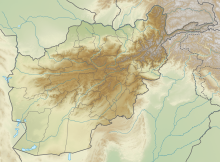Granai airstrike
| Granai airstrike | |||||
|---|---|---|---|---|---|
| Part of the War in Afghanistan (2001–2021) | |||||
| |||||
| Casualties and losses | |||||
| Estimate: 86–147 killed, mostly women and children | |||||
Location within Afghanistan | |||||
The Granai airstrike, sometimes called the Granai massacre, refers to the killing of approximately 86 to 147 Afghan civilians by an airstrike by a US Air Force B-1 Bomber on May 4, 2009, in the village of Granai (Template:Lang-ps, also Romanized Garani, Gerani, Granay)[1] in Farah Province, south of Herat, Afghanistan.[2][3][4][5][6]
The United States admitted significant errors were made in carrying out the airstrike, stating "the inability to discern the presence of civilians and avoid and/or minimize accompanying collateral damage resulted in the unintended consequence of civilian casualties".[7][8][9]
The Afghan government has said that around 140 civilians were killed, of whom 22 were adult males and 93 were children.[3][4] Afghanistan's top rights body has said 97 civilians were killed, most of them children.[3] Other estimates range from 86 to 147 civilians killed.[7][10] An earlier probe by the US military had said that 20–30 civilians were killed along with 60–65 insurgents.[3] A partially released American inquiry stated "no one will ever be able conclusively to determine the number of civilian casualties that occurred".[7] The Australian has said that the airstrike resulted in "one of the highest civilian death tolls from Western military action since foreign forces invaded Afghanistan in 2001".[11]
Airstrike video
A Combat Camera video of the airstrike was made by the bomber aircraft involved. When the Pentagon investigation on the incident was released in 2009, it did not include the video.[7][12]
By May 2010, WikiLeaks had an encrypted copy of the video it had received from then U.S. Army Specialist Chelsea Manning and was attempting to decrypt it.[13][14][15] In a March 2013 statement, Julian Assange disputed prior news reports claiming WikiLeaks had been unable to decrypt the file and alleged that the video "documented a massacre, a war crime."[16]
Assange said WikiLeaks no longer had the video due to former spokesperson Daniel Domscheit-Berg deleting it and other files when he left WikiLeaks in September 2010 and a Swedish Intelligence operation conducted in September 2010 in which other copies of the video were also lost.[16][17][18]
See also
- Haska Meyna wedding party airstrike
- Wech Baghtu wedding party airstrike
- Azizabad airstrike
- Sangin airstrike
- Civilian casualties in the War in Afghanistan (2001–2021)
References
- ^ "Hollow Excuses". Afghanistan Analysts Network - English. September 12, 2009.
- ^ Campbell, Matthew (11 April 2010). "Whistleblowers on US 'massacre' fear CIA stalkers". The Times. London. Retrieved 21 May 2010.
- ^ a b c d de Luce, Dan (8 June 2009). "We failed to follow bombing rules: Pentagon". AFP. Retrieved 21 May 2010.
- ^ a b Shalizi, Hamid; Graff, Peter (16 May 2009). "U.S. strikes killed 140 villagers: Afghan probe". Reuters. Retrieved 21 May 2010.
- ^ Gall, Carlotta; Shah, Taimoor (14 May 2009). "Afghan Villagers Describe Chaos of U.S. Strikes newspaper". The New York Times. Retrieved 21 May 2010.
- ^ Boone, Jon; MacAskill, Ewen; Tran, Mark (6 May 2009). "US air strikes kill dozens of Afghan civilians". The Guardian. London. Retrieved 21 May 2010.
- ^ a b c d Farmer, Ben (11 April 2010). "Wikileaks 'to release video of US strike on Afghan civilians'". The Daily Telegraph. London. Retrieved 21 May 2010.
- ^ Tran, Mark (3 June 2009). "US military admits errors in air strikes that killed scores of Afghan civilians". The Guardian. London. Retrieved 21 May 2010.
- ^ Schmitt, Eric P; Shanker, Thom (2 June 2009). "US Report Finds Errors in Afghan Airstrikes". The New York Times. Retrieved 21 May 2010.
- ^ Denselow, James (23 June 2010). "Hail to the whistleblowers". The Guardian. London.
- ^ "'More than 100' die in US-led air strike in Afghanistan". The Australian. 6 May 2009. Retrieved 21 May 2010.
- ^ de Luce, Dan (18 June 2009). "US military debates release of Afghan air strike probe". AFP. Retrieved 21 May 2010.
- ^ McGreal, Chris (16 June 2010). "WikiLeaks to release video of deadly US Afghan attack". The Guardian. London. Retrieved 21 June 2010.
- ^ Poulsen, Kevin; Zetter, Kim (6 June 2010). "U.S. Intelligence Analyst Arrested in Wikileaks Video Probe". Wired. Retrieved 15 June 2010.
- ^ Savage, Charlie (1 March 2013). "Soldier Admits Providing Files to WikiLeaks". The New York Times. Retrieved 13 June 2013.
- ^ a b "WikiLeaks has more US secrets, Assange says". March 5, 2013. AU: The Age. 2013-03-05. Retrieved March 5, 2013.
- ^ Assange, Julian (Verified User: _JulianAssange) (10 January 2017). "I am Julian Assange founder of WikiLeaks -- Ask Me Anything". Reddit. Retrieved 12 January 2017.
{{cite web}}:|first1=has generic name (help) - ^ Assange, Julian. "Affidavit of Julian Assange".
External links
- Gregory, Thomas (26 Apr 2012). "Potential Lives, Impossible Deaths: Afghanistan, Civilian Casualties and the Politics of Intelligibility". International Feminist Journal of Politics. 14 (3): 327–347. doi:10.1080/14616742.2012.659851. S2CID 142864199.
- Rethink Afghanistan (report from the scene), archived from the original (video) on February 1, 2013.
- Destroyed buildings and victims (images), Rawa, archived from the original on June 19, 2013. ()


